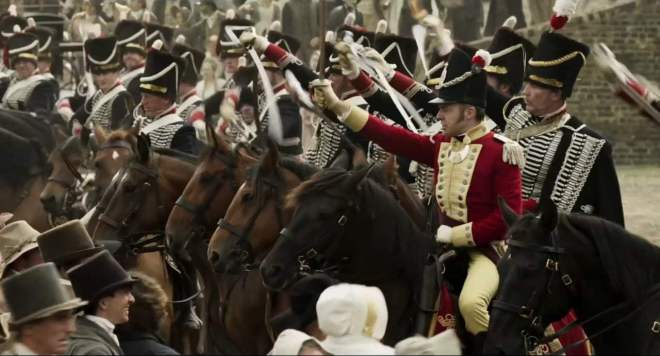Timely, uncharted moment in history.
Peterloo, for all those historically ill-informed (including myself) isn’t a real place. It was part of the snappy headline attributed to an event in 1819 – ‘The Massacre of Peterloo’. 15 people were killed in the event, and no doubt countless injured, but let me ask you; have you ever heard of this atrocity? Probably not, yet Mike Leigh, both writing and directing, takes you through this broad, empowered saga with an assured credence and a will to remind us all of its timely relevance.
Following the Duke of Wellington’s triumphant defeat over France’s Napoleon, Britain’s elite are in a state of self-righteous back-patting. The soldiers who do make it home are inflicted by PTSD, rattled by the nightmares of war. They’re also out of work, with no jobs going and those in employment facing rock-bottom wages. The power that be wouldn’t dare endorse the notion of giving the people a tiny amount more money – they avoid imports and tax the nation’s goods, forcing people to pay ludicrous prices for bread and eggs.

Yet camaraderie is rife in the community. We’re placed in Manchester for most of the feature, where Leigh illustrates a heartening portrait of life there; mothers go out flogging butter pies, people go to work in the texture mills. But there’s the harder edge; men and women regularly gather to discuss change and revolution. This is before the working man was permitted the vote, a time where democracy was scoffed at by the southern reptiles. It isn’t long before the fire of more proactive action is ignited, but that only spells more trouble for those willing to try.
The lawmakers in London (made up of a brilliantly sneering cast, including Robert Wilfort and Hot Fuzz’s Karl Johnson) are wary of the “threat of rampant insurrection” in the north, and order more focused infantry supervision in Manchester to curb revolt. There’s already a contemptuous attitude towards crimes committed by the poor; in a string of darkly humorous conviction scenes, the final judge chillingly sentences a man to death by hanging.
But Leigh’s script is absent of much levity, with the order of the day being rhetoric over action. There’s an anger that burns through Peterloo, rampant with speechifying, thick Northern dialogue woven with zingers (“The bitter cup of oppression is full to the brim”). There’s much to be said for a film that has the audacity to go the beyond 150 minutes that’s mainly a string of impassioned polemic. The storytelling suffers though, becoming less cohesive and inclusive of the rotating ensemble. While they all do sort of blend together in the end, Rory Kinnear sticks out as an elite hybrid, a voice of the people with a slight poker up where the sun don’t shine. He’s far from likeable, but he has a stupefying presence as he addresses crowds and conflicts.

From a technical standpoint, Leigh does very well to create an authentic landscape within the constraints of a smaller aspect ratio. The cinematography from Dick Pope (a frequent collaborator with Leigh) is reminiscent of Burton’s Sleepy Hollow, both ornate and baron, only infused with a little more sunshine. The score in particular, wonderfully arranged by Gary Yershon, hits the mellow beats in a similar way to James Horner’s classic Braveheart composition, used sparingly throughout to gently remind you of the theatricality of it all.
If the film starts to lose its way as the never-ending offering of speeches continue, we eventually reach St Peter’s Field, where a large, and importantly, peaceful pro-democracy rally is taking place. Politicians scramble to muffle the crowds, ordering horseback authorities to disperse the crowds. The bloodbath that follows is stunningly envisioned by Leigh, through calculated direction that avoids jolty editing, he observes man’s inhumanity to man with a steady eye. There isn’t much gore (the film is rated 12A), but there’s certainly brutality; babies are trampled and throats are slashed. Some riders cry out to their fellow officers, pleading them to stop. But the hysteria was uncontrollable, hence the end result being dubbed a massacre. If that isn’t enough, Leigh takes a page out of Ken Loach’s book and ends on a devastating, hopeless note.
Violence takes a backseat to powerful rhetoric in this dense, Universal Credit-era history lesson.
Rating: ★★★★☆
Cameron Frew – @FrewFilm
